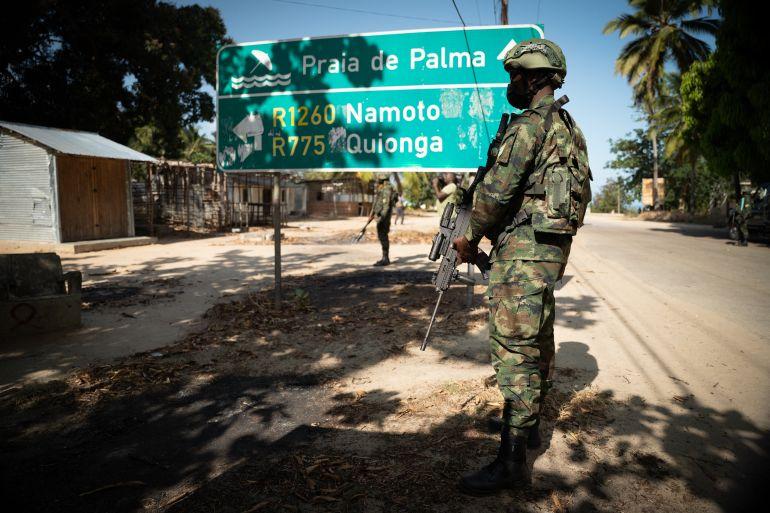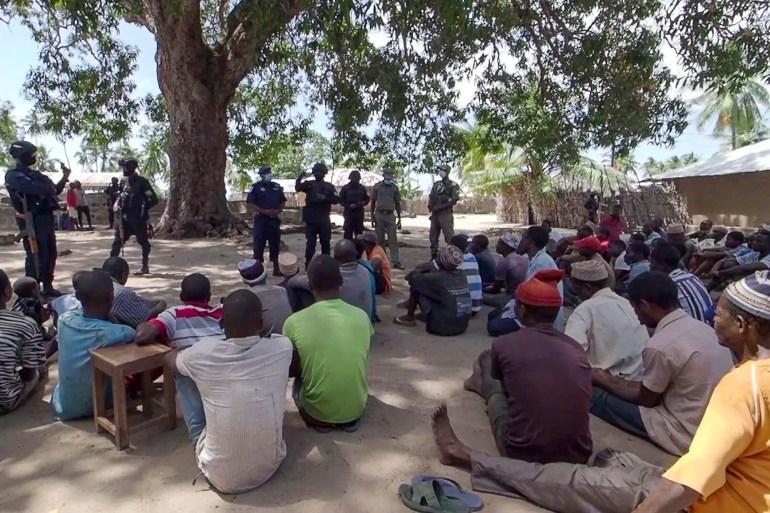Source: ALJAZEERA
ALJAZEERA MEDIA NETWORK

Cabo Delgado province grapples with vast LNG reserves and ongoing conflict, leaving civilians vulnerable.
Palma, Mozambique – As dusk approached, Awa Salama* was startled by gunfire and explosions signaling the arrival of combatants. Her neighbors frantically called their loved ones before fleeing, and Salama, securing her home, took her children and ran.
After evading capture for several days near Palma—a town located roughly 2,700km (1,700 miles) from Maputo, Mozambique's capital—Salama ventured towards the Afungi facility, part of the French company TotalEnergies' natural gas venture.
She waited there for 12 hours with thousands for a rescue ship that never materialized. Defeated, she sought refuge in Quitunda, a village designed for families displaced by the gas project.
In March 2021, Salama made another attempt to escape from Palma but failed again.
Three years later, sitting at her new home in Quitunda, she's still wary of discussing the conflict and gas project, agreeing to speak anonymously to Al Jazeera. Other Palma residents, also interviewed under the condition of anonymity, expressed similar fears about the interconnected issues of conflict and natural gas development.
Adriano Nvunga, a Mozambican activist and head of the Centre for Democracy and Human Rights, noted the significant dangers associated with speaking out critically in the country.
 Police speak to residents in Palma after an attack by armed fighters in the area in 2021.
Police speak to residents in Palma after an attack by armed fighters in the area in 2021.
Economists often refer to "the resource curse" to describe the paradox where communities with abundant natural resources face increased risk rather than prosperity.
Texas-based Anadarko, in 2009, discovered vast natural gas reserves off the coast of Cabo Delgado, sparking initial celebrations due to the potential economic boon for one of Mozambique’s poorest provinces.
However, the grand promises of prosperity had not materialized, leading to broken expectations and frustrations among the local populace.
TotalEnergies, in 2019, announced a $20 billion investment, marking the largest foreign investment on the African continent, aimed at gas development and extraction.
The development led to the displacement of communities from Afungi's 66sq km (26sq miles) area, converting it into an industrial port with an airport, power station, and housing for managerial and operational staff, all fortified for security.
Cabo Delgado, renowned for its ruby mines and smuggling trades, holds a significant historical place from the independence struggle against Portuguese colonial rule and the subsequent civil war.
Amidst the development of the Mozambique Liquified Natural Gas (LNG) Project, another war erupted involving armed groups self-identifying as “al-Shabab” (unrelated to the Somali group), who initiated violent campaigns in 2017 protesting their exclusion from local wealth.
The insurgents, notorious for their brutal tactics, have sworn allegiance to ISIL (ISIS) and have killed over 6,000 people while displacing a million others in the past seven years.
This presence of a major gas project has amplified socio-economic and political tensions while increasing the Mozambican army's pressure and international military guarding the investment.
The substantial attack on Palma in March 2021, which saw over 1,190 casualties, led TotalEnergies to declare a suspension of its project due to ongoing conflicts and heightened security concerns.
The Afungi site is now under rigorous protection by private security and joint Mozambican military and police forces.
Salama eventually fled Palma by plane, stayed in a neighboring district, and returned in 2022, only to be resettled permanently to Quitunda due to the ongoing struggles and resumption of gas development.
The increased military presence around TotalEnergies' projects has led to rampant allegations of burglaries, unlawful arrests, and assaults by the security forces against civilians in Quitunda and Palma.
Residents, including elderly women like Ancha* who witnessed raids on her property, have provided consistent accounts of military abuses in the region. These abuses include beatings, wrongful detentions, and violent assaults that went unreported officially but paint a coherent narrative of state-led exploitation and neglect surrounding the Afungi initiative.
Zenaida Machado from Human Rights Watch confirmed familiarity with the reported military assaults, detailing that such abuses had been noted by international observers. A 2023 report by UpRights criticized TotalEnergies for inadequate human rights diligence in a conflict zone.
While TotalEnergies acknowledged awareness of some violations and asserted efforts at sensitizing local communities, it deflected direct responsibility citing the prerogatives of the Mozambican state.
Displaced populations now face severe food insecurity and inflation, exacerbated by the conflict. Many Quitunda residents claim they have not been fully compensated for their lost farmlands, and the relocation has disrupted their traditional livelihoods tied to the sea.
Even as TotalEnergies maintains that all compensation processes were completed, the economic hardship continues, with residents expressing a sense of betrayal and unfulfilled promises.
International military forces have entered the region aiming to restore security, yet locals feel these troops prioritize gas project protection over civilian safety.
Displaced persons, particularly children, continue to bear the brunt of ongoing violence as the armed group shifts its activities southward, escalating the humanitarian crisis.
TotalEnergies plans to resume the gas project by 2024, amidst concerns it may exacerbate tensions if human rights issues remain unaddressed. The company has initiated social programs, but criticisms remain regarding the broader impacts of military and economic activities on the local populace.
The resumption of the project, while seen as inevitable by many, carries fears of repeating past mistakes without addressing underlying socio-political grievances, risking further destabilization and human rights abuses.
*Names have been altered for safety purposes
Your email address will not be published. Required fields are marked *